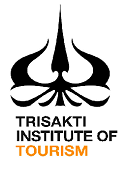Public’s Perception of Halal Food Tourism at Speciality Restaurants in Bandung
Abstract
This study aims to reveal the public’s perception and the management’s perspective about halal food tourism at speciality restaurants in Bandung. The background of this study is there are still many producers of food products that are not necessarily halal and are not yet certified by halal authorities (MUI) but they have claimed to be halal with the perception of their producers. This research uses a qualitative method. The results showed that some respondents still did not understand very well that related to the concept of halal food. All respondents agreed that the government and Indonesian Ulema Council (MUI) have a right to issue halal certificates. As for the potential for halal food in Indonesia, it is not evenly distributed, because only a few regions or certain tourist attractions have started to optimize the program. The strategy of developing halal food tourism in Indonesia can certainly be managed by the tourism sector because it is very closely related. The conclusion from this research is that there must be a halal food tourism model so that it can be used as a platform. Therefore, the role of government and society is needed to develop the potential for halal food tourism.
Keywords: Halal Food Tourism, Public’s Perception, Speciality Restaurants









